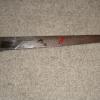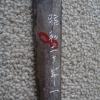Good evening! I've recently started my collection, and about a month ago bought a late war shin-gunto with mei inscription in the nakago. I wonder if you could help me knowing more about the swordsmith, era, etc. I applied chalk in the markings to help visualization. Regards, Felipe
|
|||||||||||||||||
 |
Nihonto ClubJapanese Sword Information Exchange |
User login |
|
|
Disclaimer: Nihontō Club owners and independent contributors will not be held responsible for any loss, damage or inconvenience caused as a result of any inaccuracy or error within this website. Except where otherwise noted, this page is licensed under a Creative Commons License.
|





Yoshimasa?
I think the name is "Yoshimasa" (or possibly Toshimasa?).
The date is January 1945.
It's very crudely written, which was common late in the war.
The stamps on the tang, and the painted number, also hint of a blade that was NOT made by 100% traditional methods.
Pete
Thanks Pete! So, the smith's
Thanks Pete!
So, the smith's name was Yoshimasa?
How could you tell just by looking to the number and the stamp that it was not made by traditional methods? The traditionally made does not have this kind of markings? What else could you tell me about the stamp marks made in the tang? This stamp also appear above the tang, in width.
Is there something else that I could search or do about this sword?
Too many question? I hope you don't mind!
Kind regards,
Felipe
GUNTOu
Hi, Firstly, nearly all blades made during WWII, especially the later part of the war are called "GUNTOu". The word means "military sword". They were made quickly with "shortcuts", such as oil quenching instead of water quenching. The steel probably is not "folded", but is rather just a single piece of steel.
Your pictures of the stamps are out of focus, but are probably "Showa stamps". These stamps mean that the blade was inspected by the Military. A traditionally-made blade almost NEVER has these stamps.
Pete